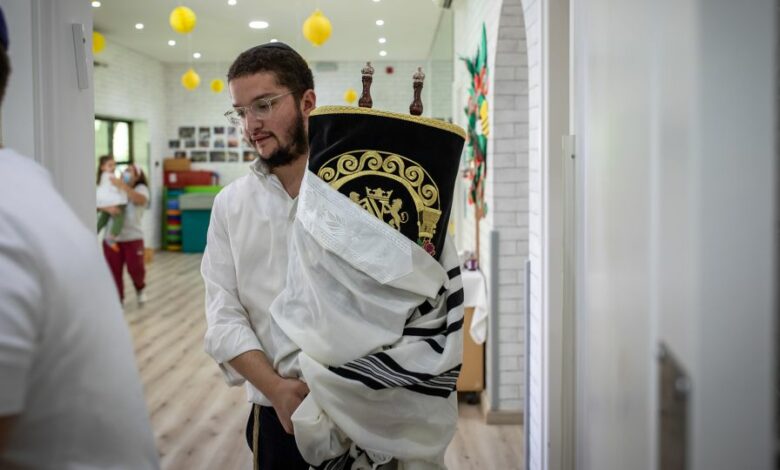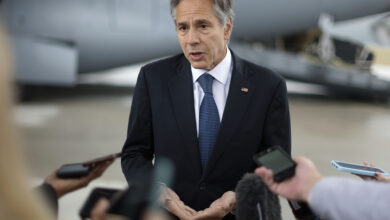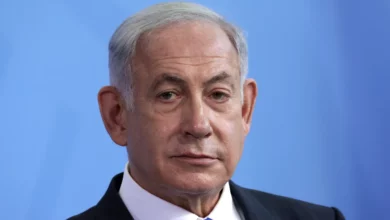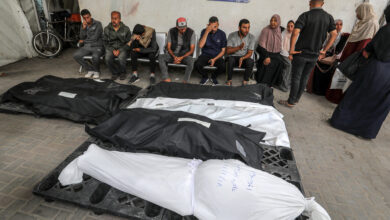
The UAE plans to include Holocaust education in the curriculum for primary and secondary schools, the country’s embassy in the United States tweeted last week.
The UAE says it will work with the Tel Aviv- and London-based Institute for Monitoring Peace and Cultural Tolerance in School Education, and Yad Vashem, the Holocaust memorial museum in Jerusalem to help build a new curriculum, according to a report in the Times of Israel.
“Now we have the opportunity to reach new audiences and Yad Vashem is working on paving the way to bring Holocaust awareness to the Arab-speaking world,” the organization’s spokesperson Simmy Allen told CNN. “Across most of the Arab-speaking world, until recently, there was little to no dialogue with Yad Vashem about the events and atrocities of the Holocaust,” he added.
The teaching of the Holocaust has been largely absent from governments’ school curricula in Arab countries, but the UAE has been doubling down on Holocaust awareness since normalizing relations with Israel in 2020 in a pact known as the Abraham Accords.
UAE Foreign Minister Abdullah Bin Zayed visited Berlin’s main Holocaust memorial in late 2020 with his Israeli counterpart. In 2021, the first Holocaust memorial exhibition in the Arab region opened in Dubai, and last year, the foreign minister made a highly publicized visit to Yad Vashem, where he laid a wreath.
In an article published in Israel’s Jerusalem Post in 2021, Ali Al Nuaimi, chairman of the Defense Affairs, Interior and Foreign Relations Committee of the UAE’s Federal National Council for the Emirate of Abu Dhabi, wrote that school curricula in the Arab world “have omitted critical parts of history in the West,” including the Holocaust, for too long. Muslims, he argued, “must liberate themselves from the burdens of history to move ahead toward the future.”
The move is “a natural outgrowth of the Abraham Accords,” Kristin Smith Diwan, senior resident scholar at the Arab Gulf States Institute in Washington, told CNN.
“The UAE leadership has been engineering cultural change to support its strategic objectives,” she said. “Embracing ethnic diversity has accompanied the expansion of a global workforce, and interfaith dialogue has aided in countering pan-Islamism and religious extremism.”
It isn’t clear whether the UAE’s move will apply only to government-run schools or the hundreds of private schools in the country. The UAE’s ministry of education didn’t respond to CNN’s request for comment by the time of publication.
Approximately 90% of the UAE’s population of about 10 million is made up of expatriates according to World Bank data, many of whom send their children to privately run schools that teach international curricula that often include Holocaust education.
Emiratis on social media were largely silent about the decision to teach the Holocaust, but Abdul Khaleq Abdulla, a prominent UAE commentator and political science professor, commented on the announcement in a tweet, saying there was no need for it.
“There has been repeated talk about adding the topic of the Holocaust to our school curricula, despite the absence of any national value, educational (benefit), and knowledge need for (it)” he tweeted.
Much of the reaction from Arabs outside the UAE was critical, with some accusing the country of handing over control of its syllabus to Israel, while others questioned whether it would come at the expense of teaching the history of the Palestinians, particularly the Nakba. The Nakba, which means catastrophe in Arabic, refers to the establishment of Israel in 1948, which saw approximately 700,000 Palestinians forced to leave their homes.
“We don’t deny the Holocaust and we sympathize with its victims,” tweeted Dareen, a commenter on Twitter who identifies as Palestinian. “But including it in the curriculum for young students makes it easier for the occupation (Israel) to infiltrate the Arab people.”
The UAE, which has a sizable Palestinian community, has said in local media reports that its normalization with Israel would not affect its commitment to the two-state solution to the Israeli-Palestinian conflict.
Yasser Abu Hilala, a former managing director at Al Jazeera, tweeted that teaching the Holocaust in the UAE was “useful for knowing the history and brutality of the West,” adding that “it is the same West from which Zionism spawned,” referring to the movement to create a Jewish state in the Middle East.
The involvement of an Israeli organization in writing the country’s syllabus brings an added layer of complexity. Polls have shown that the public in the Arab nations that have normalized relations don’t share their governments’ view in their embrace of Israel. A survey by the Washington Institute for Near East Policy in July 2022 shows that more than 70% in the UAE and Bahrain hold a negative view of normalization.
The Abraham Accords are also unpopular in other Arab nations. An opinion poll by the Qatar-based Arab Center for Research and Policy Studies released last week showed that only 7.5% of Arabs supported normalization, with 84% considering Israel to be the greatest threat to the Arab region, followed by the United States and Iran respectively.
The poll, which surveyed more than 33,000 people in 14 Arab nations, didn’t include the UAE.
Analysts say that despite the gap between official and popular views on Israel, the UAE is likely to move forward with strengthening ties with Israel.
“The Emirati public might not be entirely on board, but the leadership has decided this is the path they will pursue and so they will continue to do so,” Dina Esfandiary, senior adviser for Middle East and North Africa at the International Crisis Group, told CNN. “They believe that they have greater influence over Israel and Israeli action by maintaining these good ties.”
Some Emiratis will be uncomfortable with coordination with an Israeli institution “in a sensitive area like education” since there is popular sympathy with the plight of the Palestinians, said Diwan of the Arab Gulf States Institute.
“But this should not negate the value and importance of understanding the historical facts and context of the Holocaust,” she added. “Disinformation is a problem and serves no one.”
With additional reporting by Michael Schwartz in Jerusalem




